- Parents Feedback Path: UMS navigation → Feedback and Surveys → Parents Feedback
- Alumni Feedback Path: UMS navigation → Feedback and Surveys → Alumni Feedback on Program PO/PSO (In case of issue related to submitting of feedback, kindly write to feedback.daa@lpu.co.in)

Feedback process of the University
The University has a effective mechanism to seek feedback from different stakeholders like students, parents, Teachers, recruiters, alumni etc. The feedback received is analyzed and action is taken to improve the teaching learinig processes and experience of the stakeholders.
Students, professors, and academic experts from Institute must participate in a detailed and sophisticated evaluation procedure when developing and revising the curriculum. Prior to the end of the semester, UMS accumulates online feedback. Each semester, the curriculum review committee at the university evaluates the curriculum after gathering input from all stakeholders. The curriculum review committee discusses and implements feedback suggestions in order to preserve scheme quality and uniformity. Members of the BOS also provide advice on necessary changes.
Internal Quality Assurance Cell (IQAC) provides a vital and substantial commitment to enhancing educational quality and focuses the University's activities and measures on achieving academic excellence.
1) Student Feedback
The significance of student participation in enhancing the character of the teaching-learning environment cannot be overstated. During the 2022–2023 academic year, the University solicited feedback from students in all kinds of disciplines. Their suggestions and ratings are evaluated and presented to the Academic Council for discussion and potential incorporation into the curriculum. This year, the aggregate satisfaction rating among students is 4.15 on a scale from 1 to 5.
The school wise average satisfaction rating on the course outcomes is given in the figure below:

Legends:
| S. No. | School Name | Average Rating of CO |
|---|---|---|
| 1 | LIE (Department of Education)/LSE (Department of Education) | 4.22 |
| 2 | LIE (Department of Physical Education) | 4.32 |
| 3 | LIT (Pharmacy)/Department of Pharmaceutical Sciences | 4.39 |
| 4 | Lovely School of Architecture & Design | 4.03 |
| 5 | Mittal School of Business | 4.12 |
| 6 | School of Agriculture | 4.36 |
| 7 | School of Allied Medical Sciences | 4.15 |
| 8 | School of Bio Engineering and Biosciences | 4.24 |
| 9 | School of Chemical Engineering and Physical Sciences | 4.25 |
| 10 | School of Civil Engineering | 4.17 |
| 11 | School of Computer Application | 4.06 |
| 12 | School of Computer Science and Engineering | 4.00 |
| 13 | School of Design (Interior & Product Design) | 4.01 |
| 14 | School of Design (Fashion Design & Technology) | 4.12 |
| 15 | School of Design (Multimedia) | 4.01 |
| 16 | School of Electronics and Electrical Engineering | 4.22 |
| 17 | School of Hotel Management and Tourism-I | 4.23 |
| 18 | School of Humanities (Fine Arts) | 4.07 |
| 19 | School of Humanities (Journalism) | 4.31 |
| 20 | School of Humanities (Social Sciences & Languages) | 4.20 |
| 21 | School of Law | 4.11 |
| 22 | School of Liberal and Creative Arts (Fine Arts) | 4.19 |
| 23 | School of Liberal and Creative Arts (Journalism and Mass Communication) | 4.11 |
| 24 | School of Liberal and Creative Arts (Social Sciences & Languages) | 4.13 |
| 25 | School of Mechanical Engineering | 4.13 |
| 26 | School of Polytechnic | 4.23 |
Student Rating on Theory Courses

| Q. No | Question |
|---|---|
| 1 | Mentioned course outcome of the courses were achieved after completion of the course. |
| 2 | Teacher was able to deliver the course in alignment to course outcomes. |
| 3 | The content of this course is proper and is in logical sequence. |
| 4 | Prescribed book(s) are appropriate for this course. |
| 5 | Pedagogical strategies adopted are appropriate (e.g., discussion, brainstorming, presentation, case study, video, animation, simulation, etc.) |
| 6 | This course provides learning in terms of knowledge, concepts, skills, analytical abilities, etc. |
| 7 | Types of academic task planned are helpful in understanding the applicability of concepts. |
| 8 | This course has applicability to the real-life problems. |
| 9 | Weekly hours assigned for this course are sufficient to cover the course contents. |
| 10 | Difficulty level of the course is appropriate. |
Student Feedback on Practical Courses
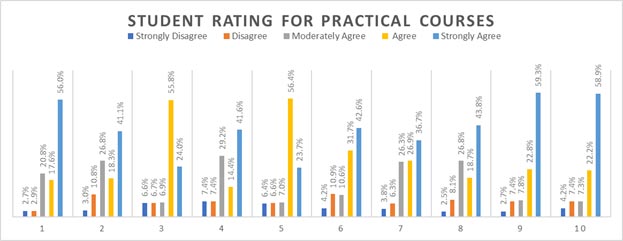
| Q No | Question |
|---|---|
| 1 | Mentioned course outcome of the courses were achieved after completion of the course. |
| 2 | Teacher was able to deliver the course in alignment to course outcome. |
| 3 | This course provides learning in terms of hands-on skill, analytical abilities etc. |
| 4 | Lab Manual/Worksheets are helpful for this course. |
| 5 | Textbook/References books are helpful for this course. |
| 6 | Number of hours provided for completion of each experiment/practical/job are sufficient. |
| 7 | Difficulty level of the course is appropriate. |
| 8 | This course has applicability to the real-life problems. |
| 9 | Experiments are relevant to the topic covered in the corresponding theory. |
| 10 | Equipment/ instrument / apparatus / hardware / software chemicals/ any other resources are available as per the requirement. |
2) Faculty’s Feedback
As a part of quality assurance, all teaching faculty members are required to attend the meeting of course coordinators conducted during the semester. The goal of these meetings is to develop and optimize the course material and pedagogical tools. During these sessions, quality improvements in learning material, student performance, research, and extension activities are also on the agenda for discussion. During this meeting, faculty members offer their comments and suggestions regarding the teaching and learning process, as well as research and extension efforts. These topics are then argued over and discussed. The responsibility of putting the suggestions into practice has been delegated to the academic council. The HOD of a course is granted the authority to modify the contents of the course based on the feedback gathered during the process of teaching and learning once they have received formal authorization for doing so from the Chairman of the Board of Studies
On Practical Courses:
The majority of the faculty members' responses indicated that they were satisfied with the experiments that were covered, the effectiveness of synchronized teaching, the importance of placements in relevant industries, the course objectives, the proper plan of experiments, learning objectives, procedures, precautions in labs, the quality of textbooks/reference books, websites, audio-visual aids, etc., relevance with the practical course, the time that was provided for the completion of each experiment, and how relevant the experiments were for co-op placements. The course outline has been updated to reflect recent developments in both the business world and the academic world. They have been satisfied with the classes that have been given to them to teach, as well as the workshops and guest lectures that have taken place over the entire term 2022-23.

| Q. No. | Question Practical |
|---|---|
| 1 | All-important experiments of the subject are covered |
| 2 | Course Coordination meetings planned to ensure synchronized teaching are effective. |
| 3 | Course is important for placements in relevant industries |
| 4 | Course objectives are appropriate |
| 5 | Experiments are appropriately planned in the IP |
| 6 | Learning objectives, procedures, precautions are properly defined in the lab manual |
| 7 | Quality of text books/reference books recommended in the syllabi. |
| 8 | Quality websites, audio-visual aids etc. are planned for relevant experiments |
| 9 | Relevance of Practical course with nature of program |
| 10 | Satisfaction with time provided for completion of each experiment |
| 11 | Syllabus is relevant for competitive examinations like GATE, UGC NET, GPAT, GMAT etc. |
| 12 | Syllabus is updated with the current trends of Industry and Academia |
On Theory Courses:
Members of the teaching staff have expressed their contentment with the academic resources that are made available to them at the institution. These resources include scientific journals, books and magazines, software, and databases, among other things. Additionally, the vast majority of them provided positive feedback on theory courses and demonstrated a high level of satisfaction with regard to the outcomes of the courses, the organization of the topics covered, the quality of the textbooks provided, the amount of time allotted for course completion, pedagogical tools, and the efficiency of course coordination meetings, among other things.
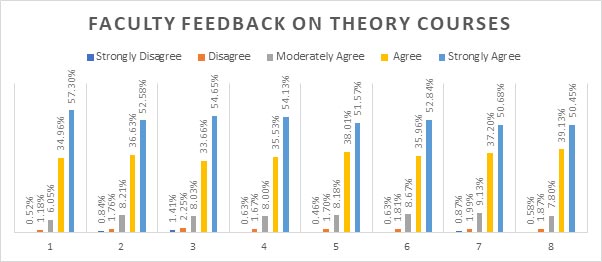
In addition to this, the teaching staff has prioritized a few other points that are connected simply with theory courses.
These points include the following: the regular incorporation of syllabus content matching with current trends of industry and academia to facilitate placements; the relevancy of the syllabus content with National and International level competitive examinations; the learning from academic tasks (such as assignments, class tests, quizzes, term papers, practical, design problems, and projects); and live examples.
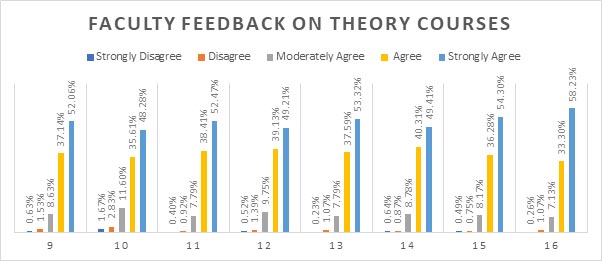
| Q. No. | Question Theory |
|---|---|
| 1 | Course Outcomes are appropriate |
| 2 | Sequence of topics in the syllabus are appropriate and are evenly distributed across the Units |
| 3 | Syllabus is adequate to be covered in a single term |
| 4 | All important areas of the subject are covered through course content. |
| 5 | Understanding level required to study this course is as per level of the student |
| 6 | Recommended textbooks cover at least 70% of the syllabus. |
| 7 | Availability of Recommended textbooks/ reference books |
| 8 | Quality of textbooks/reference books recommended in the syllabus is satisfactory. |
| 9 | Syllabus is updated with the current trends of Industry and Academia to facilitate placements. |
| 10 | Syllabus is relevant for competitive examinations like GATE, UGC NET, GPAT, GMAT etc. |
| 11 | Level of learning from Academic Task (e.g., Assignments, Class tests, Quizzes, Term Paper, Practical, Design Problems, Projects). |
| 12 | Live examples are appropriately planned in IP. |
| 13 | Pedagogical strategies (e.g., Power point presentations, case studies, videos, animations, simulations etc.) for topics in IP are relevant |
| 14 | Quality of websites, audio-visual aids etc. planned in IP are appropriate. |
| 15 | Course file maintained for each course are of good quality. |
| 16 | Course Coordination meetings planned to ensure synchronized teaching are effective. |
On Other Aspects:
More than 80% of respondents expressed satisfaction with the University's access to academic resources (books, journals, periodicals, software, databases, resource files etc.), the value added by participating in Professional Learning Community (PLC) and Faculty Development Program (FDP) sessions, the number and quality of Workshops and Guest Lectures, the accessibility of equipment, apparatus, chemicals, and software, and the usefulness of the Question Bank System
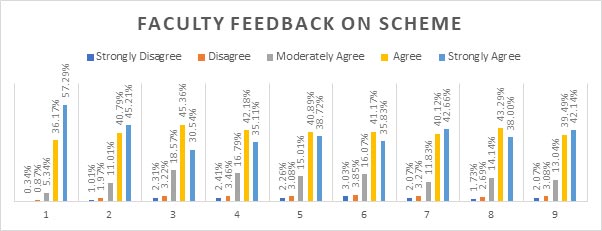
| Q. No. | Question Scheme |
|---|---|
| 1 | Satisfaction in accessibility of syllabus, Instruction Plan, Lab Manual etc. on University Management System |
| 2 | Satisfaction on availability of academic resources (Books, journals, periodicals, software, databases, resource files etc.) |
| 3 | Value addition by attending PLC/FDP sessions. |
| 4 | Workshops organized are useful and informative |
| 5 | Guest lectures organized are useful and informative |
| 6 | Availability of equipment/apparatus/chemicals/software etc. |
| 7 | Utility of question bank system |
| 8 | Effectiveness of creating focus group A and focus group B |
| 9 | Level at which the Mentor policy has been helpful in resolving problems of students |
3) Alumni Feedback:
The Lovely Professional University Alumni Association (LPUAA) assists in bringing the alumni community together on a shared platform to create another channel of personal and professional support for members through ‘self-help' within the community. Through events, guest lectures, reunions, and networking opportunities, the University attempts to keep Alumni engaged to the University. Our alumni have been kept up-to-date and informed about university news, current activities, and alumni reunions, enabling them to participate in Alumni Association procedures. We also send out a survey to alumni to gather their opinions on educational, cultural, social, and academic matters.
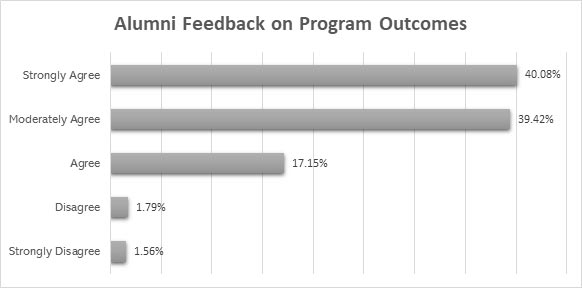
In total, the satisfaction level of Alumni on their Program Outcomes is 96.65%.
4) Parents Feedback:
At the parent-teacher conferences, questionnaires and surveys were either handed out in person or made available online to the parents. The input of the parents is solicited on a number of fronts, including but not limited to the following: the standard of education provided to the students; the level of self-control exhibited by the students; the facilities and services offered by the laboratories and information technology departments; the range of extracurricular, cultural, and athletic opportunities on offer; the structure of the assessments; and so on.
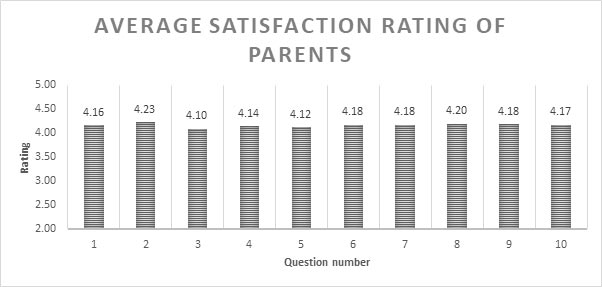
| Q. No. | Question |
|---|---|
| 1 | Curriculum is relevant for employability and job placement |
| 2 | The University provides access to vast number of academic resources in terms of books, journals, data bases, labs, workshops etc. |
| 3 | Courses in the curriculum promote Entrepreneurship and students are encouraged and supported to initiate startups. |
| 4 | The curriculum gives hands on experience to the students. |
| 5 | The curriculum has been designed to make students industry ready. |
| 6 | Students are sensitized towards societal and environmental issues and foster values through curriculum. |
| 7 | Students are provided academic flexibility through pathways/electives from own area/specialization as well as from other areas. |
| 8 | Holistic development of students is ensured by participation of students in various curricular and co-curricular . |
| 9 | The curriculum is outcome based and the expected outcomes, through various courses are attained. |
| 10 | Parent-teacher meetings organized play a significant role in enhancing a child’s education. |
5) Employer Feedback:
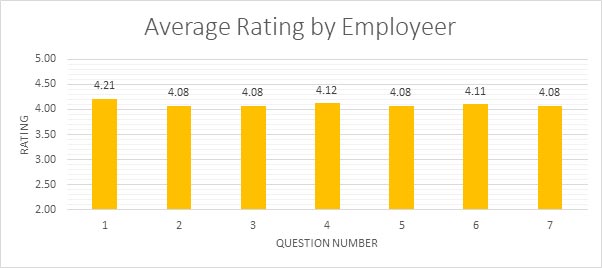
As per employer feedback received, employers were satisfied from student performance; this time feedback was taken from employer of following point.
| S. No. | Question Description |
|---|---|
| 1 | Adequate flexibility available in the choice of subjects to the students |
| 2 | Curriculum is relevant for employability and job placement |
| 3 | Effectiveness of curriculum for development of entrepreneurship |
| 4 | Curriculum is relevant for the solution of Global and National problems |
| 5 | Courses offered provides solution to issues relevant to Gender, Environment and Sustainability |
| 6 | Current syllabus is job-oriented, skill-based and value-oriented |
| 7 | Syllabus helps in bridging the gap between industry and academic institution |
In creating and revising the curriculum, students, professors, and academic experts from other Institutes must participate in a detailed and sophisticated evaluation procedure. Before the semester ends, UMS collects online feedback. After collecting opinions from all stakeholders, the university's curriculum review committee evaluates it each semester. The curriculum review committee discusses and implements feedback ideas to maintain scheme quality and consistency. BOS members also advise on necessary changes.
Internal Quality Assurance Cell (IQAC) provides a crucial and significant commitment to improving educational quality and focuses the University's activities and measures on achieving academic excellence.
1) Student Feedback
The importance of student input in enhancing the quality of the teaching-learning environment cannot be overstated. During the academic year 2021–22, the University solicited comments from students of many disciplines. Their recommendations are analysed and presented to the Academic Council for debate and possible implementation into the curriculum. The overall satisfaction rating of students (on 5-point scale) is 4.22.
The school wise average satisfaction rating on the course outcomes is given in the figure below:

Legends:
- LIE (Department of Education)
- LIE (Department of Physical Education)
- School of Pharmaceutical Sciences
- Mittal School of Business
- School of Agriculture
- Lovely School of Architecture & Design
- School of Bio Engineering and Biosciences
- School of Chemical Engineering and Physical Sciences
- School of Civil Engineering
- School of Computing
- School of Computer Science and Engineering
- School of Design
- School of Electronics and Electrical Engineering
- School of Hotel Management and Tourism
- School of Humanities
- School of Law
- School of Mechanical Engineering
- School of Allied Medical Sciences
- School of Polytechnic
Student Rating on Theory Courses:

| S. No. | Question |
|---|---|
| 1 | Difficulty level of the course is appropriate. |
| 2 | Pedagogical strategies adopted are appropriate (e.g., discussion, brainstorming, presentation, case study, video, animation, simulation, etc.). |
| 3 | Prescribed book (s) are appropriate for this course. |
| 4 | Satisfaction level of the achievements of course outcomes mentioned in the syllabus during the course delivery or completion of the course |
| 5 | The content of this course is proper and is in logical sequence. |
| 6 | This course has applicability to the real-life problems. |
| 7 | This course provides learning in terms of knowledge, concepts, skills, analytical abilities, etc. |
| 8 | Type of academic tasks planned are helpful in understanding the applicability of concepts. |
| 9 | Weekly hours assigned for this course are sufficient to cover the course contents. |
Student Feedback on Practical Courses:

| S. No. | Question |
|---|---|
| 1 | Difficulty level of the course is appropriate. |
| 2 | Equipment/ instrument/ apparatus/ hardware/ software/ chemicals/ any other resources are available as per the requirement. |
| 3 | Experiments are relevant to the topics covered in the corresponding theory course. |
| 4 | Lab manual/worksheets are helpful for this course. |
| 5 | Number of hours provided for completion of each experiment/ practical/ job are sufficient. |
| 6 | Satisfaction level of the achievements of course outcomes mentioned in the syllabus during the course delivery or completion of the course |
| 7 | Textbook/Reference books are helpful for this course. |
| 8 | This course has applicability to the real-life problems. |
| 9 | This course provides learning in terms of hands-on skill, analytical abilities etc. |
2) Faculty’s Feedback
All teaching faculty members attend the meeting of course coordinators twice a semester as part of quality assurance to improve and optimise the course material and pedagogical tools. Quality upgrades in learning material, student performance, research, and extension initiatives are also discussed at these meetings. Faculty members provide feedback/suggestions on the teaching-learning process, research, and extension activities during this meeting, which are debated and discussed. The academic council is given the task of putting the recommendations into action. After getting formal approval from the Chairman, Board of Studies, a course instructor is empowered to amend the contents of the course based on the feedback obtained during the teaching-learning process.
On Practical Courses:
The majority of the faculty members’ responses reflected satisfaction towards experiments covered, the effectiveness of synchronized teaching, importance for placements in relevant industries, course objectives, proper plan of experiments, learning objectives, procedures, precautions in labs, quality of textbooks/reference books, websites, audio-visual aids, etc. relevance with the practical course, the time provided for completion of each experiment, and relevant for competence examinations like GATE, UGC NET, GPAT, GMAT, etc. The syllabus has been modified to reflect current industry and academic trends. They are satisfied with the courses that have been assigned to them for teaching, as well as the guest lectures and workshops that have been held throughout the session 2021-22.

| S. No. | Questions on Practical Courses |
|---|---|
| 1 | All-important experiments of the subject are covered |
| 2 | Course Coordination meetings planned to ensure synchronized teaching are effective. |
| 3 | Course is important for placements in relevant industries |
| 4 | Course objectives are appropriate |
| 5 | Experiments are appropriately planned in the IP |
| 6 | Learning objectives, procedures, precautions are properly defined in the lab manual |
| 7 | Quality of textbooks/reference books recommended in the syllabi. |
| 8 | Quality websites, audio-visual aids etc. are planned for relevant experiments |
| 9 | Relevance of Practical courses with nature of program |
| 10 | Satisfaction with time provided for completion of each experiment |
| 11 | Syllabus is relevant for competence examinations like GATE, UGC NET, GPAT, GMAT etc. |
| 12 | Syllabus is updated with the current trends of Industry and Academia |
On Theory Courses:
Faculty members have reflected their satisfaction with the academic resources available in the university, e.g., scientific journals, books and periodicals, software, and database, etc. Also, most of them gave their positive feedback on theory courses and shown their strong satisfaction towards course outcomes, topics in sequence manner, quality textbooks given in the courses, the time provided for course completion, pedagogical tools, and effectiveness of course coordination meetings, etc.

| S. No. | Questions on Theory Courses |
|---|---|
| 1 | Course Outcomes are appropriate |
| 2 | Sequence of topics in the syllabus are appropriate and are evenly distributed across the Units |
| 3 | Syllabus is adequate to be covered in a single term |
| 4 | All important areas of the subject are covered through course content. |
| 5 | Understanding level required to study this course is as per level of the student |
| 6 | Recommended textbooks cover at least 70% of the syllabus. |
| 7 | Availability of Recommended textbooks/ reference books |
| 8 | Quality of textbooks/reference books recommended in the syllabus is satisfactory. |
Apart from this teaching staff has upvoted few other points which are adjoined seamlessly with theory courses such as regular incorporation of syllabus content matching with current trends of industry and academia to facilitate placements, relevancy of the syllabus content with National and International level competitive examinations, of learning from academic Task (e.g., Assignments, Class tests, Quizzes, Term Paper, Practical, Design Problems, Projects), live examples, pedagogical strategies, quality of websites, audio-visual aids, and course coordination meetings planned to ensure synchronized teaching are effective.

| S. No. | Questions on Theory Courses |
|---|---|
| 9 | Syllabus is updated with the current trends of Industry and Academia to facilitate placements. |
| 10 | Syllabus is relevant for competitive examinations like GATE, UGC NET, GPAT, GMAT etc. |
| 11 | Level of learning from Academic Task (e.g., Assignments, Class tests, Quizzes, Term Paper, Practical, Design Problems, Projects). |
| 12 | Live examples are appropriately planned in IP. |
| 13 | Pedagogical strategies (e.g., Power point presentations, case studies, videos, animations, simulations etc.) for topics in IP are relevant |
| 14 | Quality of websites, audio-visual aids etc. planned in IP are appropriate. |
| 15 | Course file maintained for each course are of good quality. |
| 16 | Course Coordination meetings planned to ensure synchronized teaching are effective. |
On Other Aspects:
More than 2/3 of the faculty members’ responses reflected satisfaction towards accessibility of syllabus, Instruction Plan, Lab Manual etc. on University Management System, availability of academic resources (Books, journals, periodicals, software, databases, resource files etc.), Value addition by attending PLC/FDP sessions, Workshops/Guest lectures organized, availability of equipment/apparatus/chemicals/software, utility of question bank system, and effectiveness of creating focus group A and focus group B.
They are satisfied with allocated courses to them for teaching and guest lectures and workshops etc., activities conducted during the session started just after COVID-19 pandemics.

| S. No. | Questions on Other Aspects |
|---|---|
| 1 | Satisfaction in accessibility of syllabus, Instruction Plan, Lab Manual etc. on University Management System |
| 2 | Satisfaction on availability of academic resources (Books, journals, periodicals, software, databases, resource files etc.) |
| 3 | Value addition by attending PLC/FDP sessions. |
| 4 | Workshops organized are useful and informative |
| 5 | Guest lectures organized are useful and informative |
| 6 | Availability of equipment/apparatus/chemicals/software etc. |
| 7 | Utility of question bank system |
| 8 | Effectiveness of creating focus group A and focus group B |
| 9 | Level at which the Mentor policy has been helpful in resolving problems of students |
3) Alumni Feedback:
The Lovely Professional University Alumni Association (LPUAA) assists in bringing the alumni community together on a shared platform to create another channel of personal and professional support for members through ‘self-help' within the community. Through events, guest lectures, reunions, and networking opportunities, the University attempts to keep Alumni engaged to the University. Our alumni have been kept up-to-date and informed about university news, current activities, and alumni reunions, enabling them to participate in Alumni Association procedures. We also send out a survey to alumni to gather their opinions on educational, cultural, social, and academic matters.

In total, the satisfaction level of Alumni on their Program Outcomes is 93.81%.
4) Parents Feedback:
Responses from parents were collected in person and online via surveys and questionnaires administered at parent-teacher meetings. The quality of the teaching, the students' discipline, the lab facilities, the information technology services, the sports, cultural, and extracurricular activities, the examination system, cross-cutting issues, start-ups, and so on are some of the parameters which are incorporated in the parent's feedback.
We also send out a survey to alumni to gather their opinions on educational, cultural, social, and academic matters.

| Sr. No. | Question |
|---|---|
| 1 | Curriculum is relevant for employability and job placement |
| 2 | The University provides access to vast number of academic resources in terms of books, journals, data bases, labs, workshops etc. |
| 3 | Courses in the curriculum promote Entrepreneurship and students are encouraged and supported to initiate start-ups. |
| 4 | The curriculum gives hands on experience to the students. |
| 5 | The curriculum has been designed to make students industry ready. |
| 6 | Students are sensitized towards societal and environmental issues and foster values through curriculum. |
| 7 | Students are provided academic flexibility through pathways/electives from own area/specialization as well as from other areas. |
| 8 | Programme outcome mentioned are in alignment to development of overall personality of student. |
| 9 | Holistic development of students is ensured by participation of students in various curricular and co-curricular. |
| 10 | The curriculum is outcome based and the expected outcomes, through various courses are attained. |
| 11 | Parent-teacher meetings organized play a significant role in enhancing a child’s education. |
5) Employer Feedback:

As per employer feedback received, employers were satisfied from student performance; this time feedback was taken from employer of following point.
| S. No. | Question Description |
|---|---|
| 1 | Adequate flexibility available in the choice of subjects to the students |
| 2 | Curriculum is relevant for employability and job placement |
| 3 | Effectiveness of curriculum for development of entrepreneurship |
| 4 | Curriculum is relevant for the solution of Global and National problems |
| 5 | Courses offered provides solution to issues relevant to Gender, Environment and Sustainability |
| 6 | Current syllabus is job-oriented, skill-based and value-oriented |
| 7 | Syllabus helps in bridging the gap between industry and academic institution |
1. Student’s Feedback
Online learning is the newest and most popular form of education in this unforeseeable situation of COVID-19 pandemic. Within the past decade it has had a major impact on postsecondary education and the trend is only increasing. Through this feedback, university end to explore like what the experience of online learning is for students, how it has changed the role of the instructor and whether education that takes place over the internet is serving equally as it was in offline classrooms. There were several questions floated to students in this survey to evaluate the proficiency and effectiveness of the online class platform to look into the areas of improvement for upgrading online learning to the next level.
- I found Online Teaching Platform user friendly.
- This platform provides important features to aid my learning process.
- Lecture notes/Videos/Animations shared by the course teacher were of high quality and aligning seamlessly to topics taught.
- I enjoyed teaching styles/Pedagogies adopted by teachers in online classes which were at par with offline teaching environment.
- I found online content delivery proficient enough to inculcate concept insights effectively.
- Teacher was approachable to discuss my doubts, Q&A during and after class.
- Evaluation in CA/MT/ET exams fairly reflects my academic performance in obtained marks.
1.I found Online Teaching Platform user friendly:
University has systematically scheduled and professionally executed Online Class using online platforms such as LPULive, CodeTantra, UMS, My Perfectice. Each platform has received very positive and encouraging feedback from the students as they found the interfaces provided by university not only user friendly but also efficient to save unnecessary time wastage. To aid the learning based on the type of class some tools have been embedded to make their learning process satisfactory. A team of dedicated and professional worked continuously to help and resolve the issues if any persisted by the student that could interrupt his/her learning.

2. This platform provides important features to aid my learning process.
Though few students stated connectivity issues at their end because of weak network connection, but to compensate, all the delivered lectures have been recorded to mitigate the learning loss of students. In this critical condition of pandemic,E-learning has proven to be excellent source of information for most of the students. Nearly half of the survey participants have cited that the features in the platform such as whiteboard, to become presenter, drawing tools and to webcam facilities for group discussion are great ideas which have made new E-learning fruitful and easy to study while sitting safe at their home.

3. Lecture notes/Videos/Animations shared by the course teacher were of high quality and aligning seamlessly to topics taught.
Most of the survey participants have appreciated the quality of lecture notes provided by faculty and relevant high-quality videos or animations shown to make the theoretical concepts crystal clear. Also, students appraisethe teaching styles and appreciate enriching and gainful pedagogies adopted by teachers in online classes. However, some students complained about the pace of delivery and their level of grasping at such high pace. Immediate actions for the same were taken and teachers ensured to maintain the pace as per the requirement of the content and to provide the supplement reading material to the weak students.

4. I enjoyed teaching styles/Pedagogies adopted by teachers in online classes which were at par with offline teaching environment.
Students are well impressed with the nature and effectiveness of the content delivery and with timely support offered by faculty members through Apps or platforms (LPULive, CodeTantra, UMS, My Perfectice). Each and every teacher is updating his/her lecture content on the routine basis before or after lecture delivery on LPULive, My Class interface to maintain a record for the same in order to avoid last minute rush of students.

5. I found online content delivery proficient enough to inculcate concept insights effectively.
Almost half of the students upvoted to the proficiency of learning through online mode as the concepts are made clear by the teachers using various examples, animations, audio-visuals and simulation practices. Although, few students demanded extra classes for practising more questions as they failed to complete their exam well on time. All such students have been that thorough Polling/quiz sessions are conducted in the classrooms and certain time limit is set up for each question to speed up their attempt.

6. Teacher was approachable to discuss my doubts, Q&A during and after class.
Question-and-answer hour during and after the classes proves to hold an innovative and positive practise for students to fully understand the concept insights. All faculty members are understanding the imperfections associated with online teaching and providing additional requirements needed as students cannot convey their problems properly. Almost 2/3 of the survey participants have appreciated the efforts being made by the faculty members. Despite few students have shown their dissatisfaction with availability of teachers to discuss doubts because of poor internet connectivity issues during classes. University is continuously managing online lecture material and LPULive app to chat with course teacher in order to clear their doubts.

7. Evaluation in CA/MT/ET exams fairly reflects my academic performance in obtained marks.
Evaluations are a great way to identify the areas in which students
need improvement and to track student’s progress. More than 40% students
have shown their agreement that their academic performance displayed as
obtained marks is very true and matches to their expectations. Also,
evaluation system of the university is commended by them on the basis of
resources and level of comfort provided to before and during the
examination. Overall, rating shows their level of satisfaction in the
evaluation of CA/MT/ETE. Though, some of the students cited some points
relevant to exams like:
Provide text messages as exam reminder 24 hrs ago, it’s better to give
exams in OAS rather than MyClass, change in the examination pattern, I
would like to change the time-bound in the MTE and ETE exam for per
question. These all suggestions have been discussed in the meetings with
higher authorities and feasible actions have been taken to fulfill the
vision of university to provide quality teaching practices.

2. Faculty’s Feedback
The university has made it a part of quality assurance to conduct a meeting of course coordinators twice a semester by all teaching faculty members in order to improve the course content and pedagogical tools being used. These meetings also focus on qualitative updates in learning material, student’s performance, research, and extension activities. At this time faculty member express their feedback/suggestions on the teaching-learning process; research, and extension activities which is debated and discussed this meeting. The appropriate suggestions were put forward to the academic council for implementations. Based on the feedback obtained during the teaching-learning process, a course teacher was empowered to revise the contents of the course after obtaining formal approval from the Chairman, Board of Studies.
On Practical Courses:
The majority of the faculty members’ responses reflected satisfaction towards experiments covered, effectiveness of synchronized teaching, important for placements in relevant industries, course objectives, proper plan of experiments, learning objectives, procedures, precautions in labs, quality of text books/reference books, websites, audio-visual aids etc. relevance with practical course, time provided for completion of each experiment, and relevant for competence examinations like GATE, UGC NET, GPAT, GMAT etc. Syllabus is updated with the current trends of Industry and Academia. They are satisfied with allocated courses to them for teaching and guest lectures and workshops etc., activities conducted during the session 2020-21.

| S No. | Questions on Practical Courses |
|---|---|
| All-important experiments of the subject are covered | |
| 2 | Course Coordination meetings planned to ensure synchronized teaching are effective. |
| 3 | Course is important for placements in relevant industries |
| 4 | Course objectives are appropriate |
| 5 | Experiments are appropriately planned in the IP |
| 6 | Learning objectives, procedures, precautions are properly defined in the lab manual |
| 7 | Quality of textbooks/reference books recommended in the syllabi. |
| 8 | Quality websites, audio-visual aids etc. are planned for relevant experiments |
| 9 | Relevance of Practical course with nature of program |
| 10 | Satisfaction with time provided for completion of each experiment |
| 11 | Syllabus is relevant for competence examinations like GATE, UGC NET, GPAT, GMAT etc. |
| 12 | Syllabus is updated with the current trends of Industry and Academia |
On Theory Courses:
Faculty members have reflected their satisfaction with the academic resources available in the university, e.g., scientific journals, books and periodicals, software and database, etc. Also, most of them gave their positive feedback on theory courses and shown their strong satisfaction towards course outcomes, topics in sequence manner, quality textbooks given in the courses, the time provided for course completion, pedagogical tools, and effectiveness of course coordination meetings, etc.

| S No. | Questions on Theory Courses |
|---|---|
| 1 | Course Outcomes are appropriate |
| 2 | Sequence of topics in the syllabus are appropriate and are evenly distributed across the Units |
| 3 | Syllabus is adequate to be covered in a single term |
| 4 | All important areas of the subject are covered through course content. |
| 5 | Understanding level required to study this course is as per level of the student |
| 6 | Recommended textbooks cover at least 70% of the syllabus. |
| 7 | Availability of Recommended textbooks/ reference books |
| 8 | Quality of textbooks/reference books recommended in the syllabus is satisfactory. |
Apart from this teaching staff has upvoted few other points which are adjoined seamlessly with theory courses such as regular incorporation of syllabus content matching with current trends of industry and academia to facilitate placements, relevancy of the syllabus content with National and International level competitive examinations, of learning from academic Task (e.g., Assignments, Class tests, Quizzes, Term Paper, Practical, Design Problems, Projects), live examples, pedagogical strategies, quality of websites, audio-visual aids, and course coordination meetings planned to ensure synchronized teaching are effective.

| S No. | Questions on Theory Courses |
|---|---|
| 9 | Syllabus is updated with the current trends of Industry and Academia to facilitate placements. |
| 10 | Syllabus is relevant for competitive examinations like GATE, UGC NET, GPAT, GMAT etc. |
| 11 | Level of learning from Academic Task (e.g., Assignments, Class tests, Quizzes, Term Paper, Practical, Design Problems, Projects). |
| 12 | Live examples are appropriately planned in IP. |
| 13 | Pedagogical strategies (e.g., Power point presentations, case studies, videos, animations, simulations etc.) for topics in IP are relevant |
| 14 | Quality of websites, audio-visual aids etc. planned in IP are appropriate. |
| 15 | Course file maintained for each course are of good quality. |
| 16 | Course Coordination meetings planned to ensure synchronized teaching are effective. |
On Other Aspects:
More than 2/3 of the faculty members’ responses reflected satisfaction towards accessibility of syllabus, Instruction Plan, Lab Manual etc. on University Management System, availability of academic resources (Books, journals, periodicals, software, databases, resource files etc.), Value addition by attending PLC/FDP sessions, Workshops/Guest lectures organized, availability of equipment/apparatus/chemicals/software, utility of question bank system, and effectiveness of creating focus group A and focus group B.
They are satisfied with allocated courses to them for teaching and guest lectures and workshops etc., activities conducted during the session started just after COVID-19 pandemics.

| SNo. | Questions on Other Aspects |
|---|---|
| 1 | Satisfaction in accessibility of syllabus, Instruction Plan, Lab Manual etc. on University Management System |
| 2 | Satisfaction on availability of academic resources (Books, journals, periodicals, software, databases, resource files etc.) |
| 3 | Value addition by attending PLC/FDP sessions. |
| 4 | Workshops organized are useful and informative |
| 5 | Guest lectures organized are useful and informative |
| 6 | Availability of equipment/apparatus/chemicals/software etc. |
| 7 | Utility of question bank system |
| 8 | Effectiveness of creating focus group A and focus group B |
| 9 | Level at which the Mentor policy has been helpful in resolving problems of students |
3. Alumni Feedback
The Lovely Professional University Alumni Association (LPUAA) helps in bringing together the alumni community on a common platform to build another channel of personal and professional support to members through 'self-help' within community. University aims to keep the Alumni connected to the University via events, guest lectures, reunions and networking opportunities. Our alumni have been kept updated and informed of the University's news, current events and alumni reunions, which helps them to participate in the proceedings of the Alumni Association. We also float a survey to the alumni for gaining their ideas and views on educational, cultural, social and academic affairs.
Most of the alumni upvoted the curriculum and schemes taught to them. They commend that curriculum has helped in meeting the job opportunity and placements. In addition to this, alumni have confirmed that their choice for choosing a subject was very flexible by providing high rating remarks. Nearly half of the Alumni meet participants provided their agreement with result oriented academic tasks, community development projects, field projects, case studies, quizzes, industrial visits, seminars, workshops, guest lectures, etc., which are facilitating them to enlarge their practical and theoretical knowledge. Curriculum has enabled most of them to meet the job opportunities and secure placements in reputed companies.

Practical, participative learning and problem-solving methodologies are the integrated parts of teaching-learning process. Student’s performance and learning outcomes are measured through the attainment of Programme Outcomes, Course Outcomes and evaluations carried by the experts from various organizations. Industrial-Institute collaborative and Intra-University Competitions to measure the attainments of course outcomes and requisite level of understanding among the students. Students cleared IELTS/Civil services examination/national competitive examinations/UGC NET.
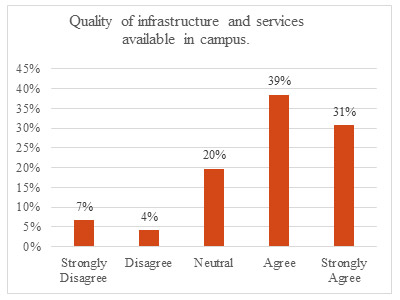
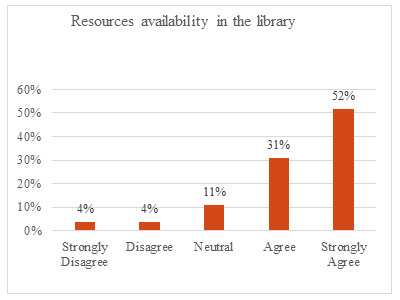
Most of the students agreed with quality and pace at which the Professional enhancement / Communication Skills inputs were provided to them during their studies. These courses enabled them to become ready for group discussions and personal interviews. Apart from this problem faced by the students related to academics, hostel, administration is resolved by the concerned official within given timeline on priority basis to facilitate the students in a better way. In case issues are taking more than usual; progress bar of the case is displayed to the students and all other associated persons with the case.
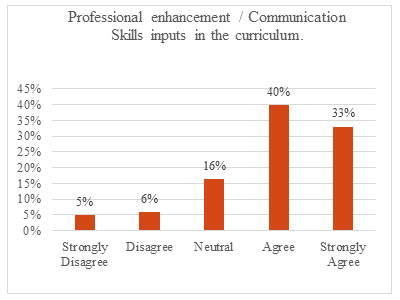
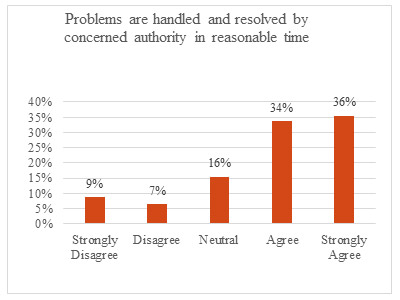
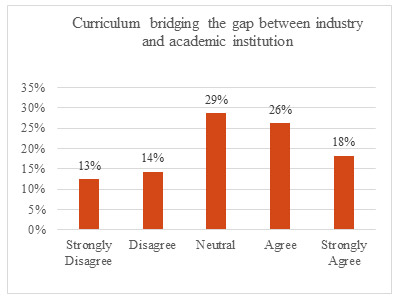
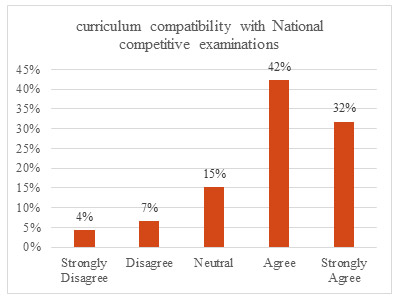
Alumni expressed their satisfaction with the quality of infra and services provided by different departments of the university such as examination, career services, academic affairs, admin offices, division of student welfare and students relationship. They are also convinced with the availability of world class learning resources, e-books, e-journals, data bases SCOPUS, Web of Science, Shodh Ganga, etc. in the library as well as in remote access. In addition, faculty members have also shared various authentic e-sources with the students to support the studies of students.
What students require today in academic institutes is not just academic lessons. Thus, a system that helps a student to understand his or her self-emotions, and mental duress while teaching him or she how to build up healthy and functional relationships as well as develop resilience and team spirit is the true form of education. Our alumni have provided their agreement to support our ongoing procedures followed for the betterment of students. Also, they have brought some areas of improvement into light which would be helpful for us to grow more and improve precisely. LPU is such a system that boosts the morale of a student so that they can go on to achieve greater heights in their careers while becoming upstanding citizens of the society who contribute to the growth and development of the country. Hence, the holistic development of students is very important right from the beginning of professional life. University authorities and teachers keep focus on curriculum of every Programme to ensure weather it is integrated and build with various co-curricular activities for the holistic development of students
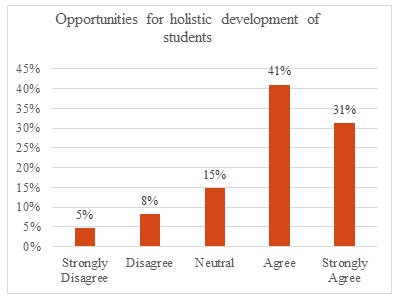
4. Employer feedback
As per employer feedback received, employers were satisfied from student performance; this time feedback was taken from employer of following point.
| Sr. no. | Description |
|---|---|
| 1 | Adequate flexibility available in the choice of subjects to the students |
| 2 | Curriculum is relevant for employability and job placement |
| 3 | Effectiveness of curriculum for development of entrepreneurship |
| 4 | Curriculum is relevant for the solution of Global and National problems |
| 5 | Courses offered provides solution to issues relevant to Gender, Environment and Sustainability |
| 6 | Current syllabus is job-oriented, skill-based and value-oriented |
| 7 | Syllabus helps in bridging the gap between industry and academic institution |
Besides these few employers have provided some suggestion need to be incorporated in the schemes, which are as follows:
- There should be more focus on building student’s aptitude and grammar.
- Students Need to be aware of the current development and changes and technologies languages that are coming up needs to be more confident in their approach
- Better all-round development of the Interpersonal and communication skills
- Need to improve coding as a skill. Give them more time and tools to practice.
- Should develop "Soft skills culture" for the students where the focus should be on "communication skills, cultural adaptability, leadership skills, Mobility".
- Students need to improve on grooming and group discussion skill.

5. Parents Feedback:
Parent feedback was also obtained from respondents during PTMs and through UMS. Some of the parameters accommodated in the parent’s feedback include quality of teaching, students’ discipline, lab facilities, IT services, sports, cultural and co-curricular activities, examination system, cross-cutting issues, start-ups, etc.
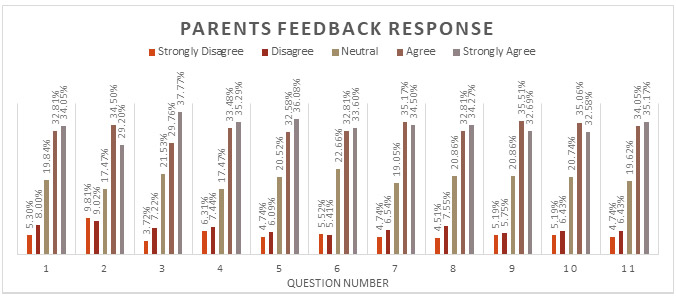
| S. No. | Questions |
|---|---|
| 1 | Curriculum is relevant for employability and job placement. |
| 2 | The University provides access to vast number of academic resources in terms of books, journals, data bases, labs, workshops etc. |
| 3 | Courses in the curriculum promote Entrepreneurship and students are encouraged and supported to initiate startups. |
| 4 | The curriculum gives hands on experience to the students. |
| 5 | The curriculum has been designed to make students industry ready. |
| 6 | Students are sensitized towards societal and environmental issues and foster values through curriculum. |
| 7 | Students are provided academic flexibility through pathways/electives from own area/specialization as well as from other areas. |
| 8 | Program outcome mentioned are in alignment to development of overall personality of student. |
| 9 | Holistic development of students is ensured by participation of students in various curricular and co-curricular. |
| 10 | The curriculum is outcome based and the expected outcomes, through various courses are attained. |
| 11 | Parent-teacher meetings organized play a significant role in enhancing a child’s education. |
Overall, 88% of parents were satisfied with the various facilities provided by the University for the holistic development of a student.





